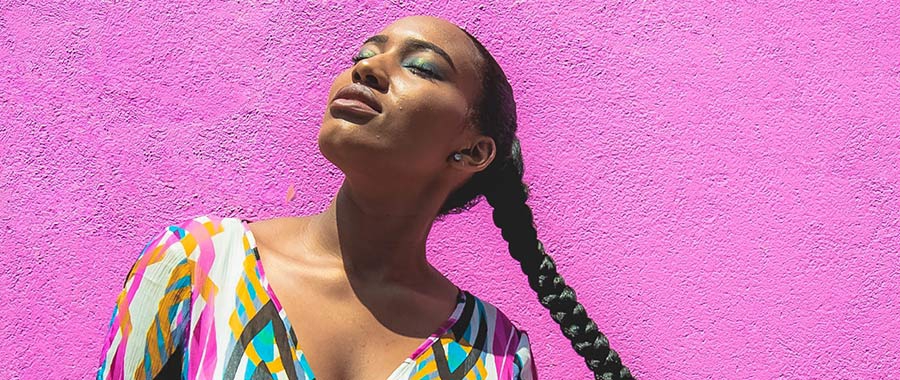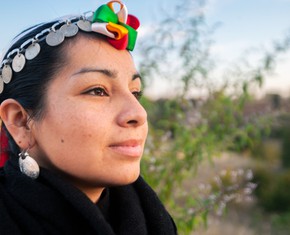The views expressed in our content reflect individual perspectives and do not represent the authoritative views of the Baha'i Faith.
Have you ever seen a rose growing through concrete? Usually, the presence of beautiful roses means a good gardener has been hard at work, right?
In her 2002 recording A Seed will Grow the British singer and rapper Ms. Dynamite collaborated with Jamaican reggae artist Kymani Marley—scion of the Bob Marley clan—for a lyrical lament about the moral recklessness of a society that institutionalizes poverty, consigning the poor to the margins where resignation and hopelessness suffocate dreams and starve ambition.
In the song Ms. Dynamite, an innovative wordsmith of nimble dexterity, weaves a defiant narrative of spiritual resistance through a pulsating percussive beat as she and Mr. Marley spin a tale of heartbreak and redemption sprung from the parched soil of the ghetto.
About halfway through the song, Ms. Dynamite, in a display of metaphorical brilliance, frames the moral dilemma of the poor, who live at points of tension between the stultifying affects of poverty and the enduring resiliency of the human spirit. She raps, “so many seeds in the street, no sunshine but always heat and lives lost at every heart beat”—and again, “so many seeds in the street, drowning in poverty and deceit, but black roses grow from concrete.”
These two phrases, rich in poetic allegory, contrast the social perils faced by the dispossessed with the triumph of the few who, despite unimaginable odds, find ways to transcend their circumstance. Popular culture is replete with Horatio Alger-like stories of the forgotten rising from obscurity to achieve great success. Literature and films celebrate this reductive narrative, which too often identify will and determination as the sole criteria for achievement, relieving society of the burden of responsibility for having tolerated a social order that creates the brutal conditions of poverty in the first place.
But what of the countless others who don’t make it out? What measure of loss does humanity suffer for having so carelessly squandered the potential of so many? Baha’u’llah, the prophet and founder of the Baha’i Faith, said: “Regard man as a mine rich in gems of inestimable value. Education can, alone, cause it to reveal its treasures, and enable mankind to benefit therefrom.” – Tablets of Baha’u’llah, p. 162.
This remarkable statement makes a universal declaration of the priceless nature of humanity—all of humanity. It doesn’t ascribe this immeasurable value only to the wealthy, or the educated, or the socially connected. Baha’u’llah asserted that every individual, regardless of circumstance, represents a universe of latent potentialities and possibilities, which must be drawn out through an education—not only material, but also spiritual in nature. In addition, Baha’u’llah linked the development of this precious resource to the welfare of humanity as a whole—so we dismiss, demoralize, denigrate, and devalue others at our own peril.
I was fortunate enough to attend Arts High School in Newark, New Jersey. Founded in 1931, this respected institution has produced such distinguished alumni as the great jazz vocalist Sarah Vaughn; composer and saxophonist Wayne Shorter; tap dancer and choreographer Savion Glover, and Black Panther actor Michael B. Jordan. When I attended classes there in the late 1980’s, Newark was widely regarded as a textbook example of urban blight. The gutted interiors of abandoned tenement buildings—ghostly evidence of the 1967 race riots—still dotted the landscape. The scourge of crack cocaine, which destroyed the lives of so many in the late 80’s and early 90’s, spread its ominous tentacles through various neighborhoods. Graft and fiscal mismanagement corrupted city governance as whole communities sank beneath a deluge of poverty and neglect.
Despite the challenges afflicting the city, Arts High remained a beacon of hope for the young and the gifted. It was a promise; a brick and mortar incubator of dreams. We students were an assortment of aspirational black and brown kids, English and Spanish speaking, endowed with creative talents and dreams. We painted, danced, played instruments, acted, and wrote our way through four years of focused study, hopeful that ability coupled with hard work and a little luck would carry us over the pitfalls of deprivation and despair.
It worked for some of us, but for far too many it did not. In a society infected by the twin cankers of racism and excessive materialism, being born black and poor can feel like a straitjacket that renders inert the wings of those whom God has created to fly.
Carmen, was a young, attractive and gifted theater student in my graduating class, whose captivating smile and arresting stage presence belied the many burdens her slight frame was forced to bear. Her large brown eyes, beguiling and expressive, seemed forlorn and distant, as though she were not fully present, like some part of herself remained vacant. In the fall of 1988, as many of my classmates began their freshman year of college, or entered the workforce, Carmen descended into a destructive life of drug abuse and prostitution that would eventually lead to her death at the age of twenty five. She was a seed, recklessly discarded on concrete, where her roots could not take hold.
In the Spring of 1912 Abdu’l-Baha, the son of Baha’u’llah and his appointed successor, arrived in New York City as part of his three year journey throughout the West to spread the unifying message of the Baha’i Faith. One day, while staying at the home of a prominent American Baha’i, a large group of young boys from an impoverished section of the city was ushered into his presence. Abdu’l-Baha greeted each child with laughter and an inviting smile. Among the boys was a thirteen year old black child whose downcast eyes reflected the social stigma of his dark complexion. Abdul-Baha, whose penetrating insight and wisdom no doubt recognized the boy’s dispirited demeanor, welcomed him with great enthusiasm, announcing to the all those present that “here was a black rose,” at which point the child’s troubled countenance vanished, replaced by a beaming smile. One simple phrase of encouragement, lovingly chosen and perfectly placed, lifted the spirit of the downtrodden and affirmed in clear and emphatic language the dignity and worth of all of God’s creation.
Kind words, it seems, can do magical things.
Abdul-Baha compared the family of man to a garden of diverse flowers differing in color and appearance but sustained by the same divine source:
Consider the flowers of a garden: though differing in kind, colour, form and shape, yet, inasmuch as they are refreshed by the waters of one spring, revived by the breath of one wind, invigorated by the rays of one sun, this diversity increaseth their charm, and addeth unto their beauty. Thus when that unifying force, the penetrating influence of the Word of God, taketh effect, the difference of customs, manners, habits, ideas, opinions and dispositions embellisheth the world of humanity. This diversity, this difference is like the naturally created dissimilarity and variety of the limbs and organs of the human body, for each one contributeth to the beauty, efficiency and perfection of the whole. – Abdu’l-Baha, Selections from the Writings of Abdu’l-Baha, p. 291.
Reflecting on this spellbinding statement, it seems to me that part of my responsibility, as a noble reflection of God’s grace, is to nurture not only my own growth, but also the growth of others, paying particular attention to those marginalized flowers deprived of the sunlight. I want to care for these tender plants, to water them, and cajole them into budding. I want to lift them to a high place where the healing rays of the sun can restore their luster and brilliance. If I can make of myself a loving and attentive gardener, I may soon discover that brilliant roses redolent with sublime, aromatic fragrances can spring from unexpected places:
O Children of Men! Know ye not why We created you all from the same dust? That no one should exalt himself over the other. Ponder at all times in your hearts how ye were created. Since We have created you all from one same substance it is incumbent on you to be even as one soul, to walk with the same feet, eat with the same mouth and dwell in the same land, that from your inmost being, by your deeds and actions, the signs of oneness and the essence of detachment may be made manifest. – Baha’u’llah, The Hidden Words, p. 20.
















Comments
Sign in or create an account
Continue with Googleor